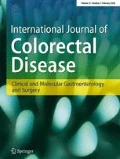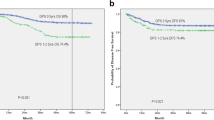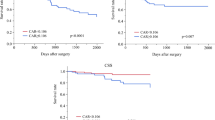Abstract
Background/aims
The aim of the study was to examine the value of the combination of an elevated C-reactive protein and hypoalbuminaemia (GPS) in predicting cancer-specific survival after resection for colon and rectal cancer.
Materials and methods
The GPS was constructed as follows: Patients with both an elevated C-reactive protein (>10 mg/l) and hypoalbuminaemia (<35 g/l) were allocated a score of 2. Patients in whom only one or none of these biochemical abnormalities was present were allocated a score of 1 or 0, respectively.
Results
A GPS of 1 (n = 109) was mainly due to an elevated C-reactive protein concentration and the remainder due to hypoalbuminaemia. In those patients with a GPS of 1 due to hypoalbuminaemia (n = 16), the 3-year overall survival rate was 94% compared with 62% in those patients with a GPS of 1 due to an elevated C-reactive protein concentration (n = 93, p = 0.0094). Therefore, the GPS was modified such that patients with hypoalbuminaemia were assigned a score of 0 in the absence of an elevated C-reactive protein. On univariate analysis of those patients with colon and rectal cancer, the modified GPS (p < 0.0001) was significantly associated with overall and cancer specific survival. On univariate survival analysis of those patients with Dukes B colon and rectal cancer, the modified GPS (p < 0.01) was significantly associated with overall and cancer specific survival.
Conclusion
The results of the present study indicate that the GPS, before surgery, predicts overall and cancer-specific survival after resection of colon and rectal cancer.
Similar content being viewed by others
References
Cancerstats (2004) http://www. cancerresearchuk.org
McArdle CS, Hole DJ (2002) Outcome following surgery for colorectal cancer: analysis by hospital after adjustment for case-mix and deprivation. Br J Cancer 86:331–335
Graziano F, Cascinu S (2003) Prognostic molecular markers for planning adjuvant chemotherapy trials in Dukes’ B colorectal cancer patients: how much evidence is enough? Ann Oncol 14:1026–1038
Longo WE, Virgo KS, Johnson FE, Wade TP, Vernava AM, Phelan MA, Henderson WG, Daley J, Khuri SF (1998) Outcome after proctectomy for rectal cancer in Department of Veterans Affairs Hospitals: a report from the National Surgical Quality Improvement Program. Ann Surg 228:64–70
Heys SD, Walker LG, Deehan DJ, Eremin OE (1998) Serum albumin: a prognostic indicator in patients with colorectal cancer. J R Coll Surg Edinb 43:163–168
Longo WE, Virgo KS, Johnson FE, Oprian CA, Vernava AM, Wade TP, Phelan MA, Henderson WG, Daley J, Khuri SF (2000) Risk factors for morbidity and mortality after colectomy for colon cancer. Dis Colon Rectum 43:83–91
Nozoe T, Matsumata T, Kitamura M, Sugimachi K (1998) Significance of preoperative elevation of serum C-reactive protein as an indicator for prognosis in colorectal cancer. Am J Surg 176:335–338
Nielsen HJ, Christensen IJ, Sorensen S, Moesgaard F, Brunner N (2000) Preoperative plasma plasminogen activator inhibitor type-1 and serum C-reactive protein levels in patients with colorectal cancer. The RANX05 Colorectal Cancer Study Group. Ann Surg Oncol 7:617–623
McMillan DC, Canna K, McArdle CS (2003) Systemic inflammatory response predicts survival following curative resection of colorectal cancer. Br J Surg 90:215–219
Forrest LM, McMillan DC, McArdle CS, Angerson WJ, Dunlop DJ (2003) Evaluation of cumulative prognostic scores based on the systemic inflammatory response in patients with inoperable non-small-cell lung cancer. Br J Cancer 89:1028–1030
Forrest LM, McMillan DC, McArdle CS, Angerson WJ, Dagg K, Scott HR (2005) A prospective longitudinal study of performance status, an inflammation-based score (GPS) and survival in patients with inoperable non-small-cell lung cancer. Br J Cancer 92:1834–1836
Al Murri AM, Bartlett JM, Canney PA, Doughty JC, Wilson C, McMillan DC (2006) Evaluation of an inflammation-based prognostic score (GPS) in patients with metastatic breast cancer. Br J Cancer 94:227–230
Crumley AB, McMillan DC, McKernan M, McDonald AC, Stuart RC (2006) Evaluation of an inflammation-based prognostic score in patients with inoperable gastro-oesophageal cancer. Br J Cancer 94:637–641
Glen P, Jamieson NB, McMillan DC, Carter R, Imrie CW, McKay CJ (2006) Evaluation of an inflammation-based prognostic score in patients with inoperable pancreatic cancer. Pancreatology 6:450–453
Dukes CE, Bussey HJR (1958) The spread of rectal cancer and its effect on prognosis. Br J Cancer 12:309–320
McMillan DC, Scott HR, Watson WS, Preston T, Milroy R, McArdle CS (1998) Longitudinal study of body cell mass depletion and the inflammatory response in cancer patients. Nutr Cancer 31:101–105
Fearon KC, Barber MD, Falconer JS, McMillan DC, Ross JA, Preston T (1999) Pancreatic cancer as a model: inflammatory mediators, acute-phase response, and cancer cachexia. World J Surg 23:584–588
McMillan DC, Watson WS, O’Gorman P, Preston T, Scott HR, McArdle CS (2001) Albumin concentrations are primarily determined by the body cell mass and the systemic inflammatory response in cancer patients with weight loss. Nutr Cancer 39:210–213
Kotler DP (2000) Cachexia. Ann Intern Med 133:622–634
Morley JE, Thomas DR, Wilson MM (2006) Cachexia: pathophysiology and clinical relevance. Am J Clin Nutr 83:735–743
Kritchevsky SB, Cesari M, Pahor M (2005) Inflammatory markers and cardiovascular health in older adults. Cardiovasc Res 66:265–275
Tsimikas S, Willerson JT, Ridker PM (2006) C-reactive protein and other emerging blood biomarkers to optimize risk stratification of vulnerable patients. J Am Coll Cardiol 47(8 Suppl):C19–C31
Acknowledgement
We gratefully acknowledge the assistance of the surgeons of the colorectal unit, Royal Infirmary, Glasgow.
Conflict of interest statement
None declared.
Author information
Authors and Affiliations
Corresponding author
Rights and permissions
About this article
Cite this article
McMillan, D.C., Crozier, J.E.M., Canna, K. et al. Evaluation of an inflammation-based prognostic score (GPS) in patients undergoing resection for colon and rectal cancer. Int J Colorectal Dis 22, 881–886 (2007). https://doi.org/10.1007/s00384-006-0259-6
Accepted:
Published:
Issue Date:
DOI: https://doi.org/10.1007/s00384-006-0259-6




